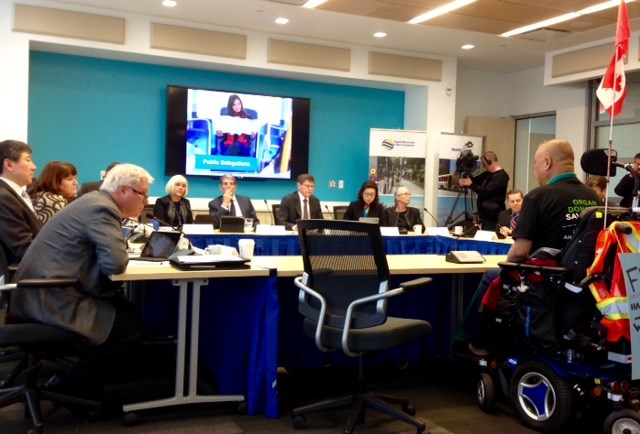I have to say, I got semi-excited last summer when TransLink announced it was going to open its board of directors' meetings to the public.
Great, I thought, now we can see how the directors operate, how they interact with senior staff and how they're overseeing Metro Vancouver's transportation network.
This is what the board's vice-chairperson, Barry Forbes, said back in June 2015: "This is the next step in improving transparency for our customers and stakeholders. We welcome public scrutiny and we expect the public to hold us to account."
Forbes continued, promising to make more information available to the public than ever before, including board reports, business plans and budgets, reports about operational performance, audited financial statements, customer satisfaction reports and executive and employee salary information.
All helpful information for taxpayers, and some of it has gone public.
But as I discovered when I showed up to Wednesday's board meeting at TransLink's offices in New Westminster, the 11-person board still has some work to do on the information sharing side.
Here's some insight: For two-and-a-half hours, I listened to presentations from senior staff and relied on a combination of note taking and my digital recorder to capture what was said. I also used my phone to snap a few photos when a graph or interesting information was projected on a screen.
Some big topics were discussed, including the Compass Card, ridership numbers, closing all fare gates, safety and security, finances, changing bus routes and updates on proposals to build rapid transit lines in Surrey and Vancouver.
Of course, I couldn't get it all down. And some of the numbers and language used were taxing on the brain. Not to worry, I thought, because I'll sort it all out when I get my hands on the reports tied to the presentations.
But, as you likely surmised from my last sentence, there were no reports available for the public. So at a break in the meeting, I approached board chairperson Don Rose and asked him to explain.
"The process of open board meetings is relatively new to us," he said, noting it was the third such meeting. "We've had changes in senior management and I would say we haven't developed a routine that works as well as it might in the future. So that's something that we can look at. But that's the process we have now."
That "process," as I learned from TransLink public relations staffer Jennifer Morland -- who showed up at Rose's side after I asked my first question -- is that reports from the meeting would be available online within five business days.
That's correct, five business days.
Morland: "We can let you know when it's available, if that works for you."
Me: "So it won't be available today?"
Morland: "No."
Me: "And why is that?"
Morland: "I don't know. If that's something you want more information on, we can definitely follow up with you after the fact."
Kind of astonishing, don't you think, for two reasons:
1) Today's 24/7 news cycle depends on information being available on the day news happens. A report can provide context, important detail and, most importantly, accuracy.
2) The board’s five-business-day policy ignores what other public bodies such as city councils, police boards, school boards and Metro Vancouver have done for years -- they not only post reports online, but do so several days before a meeting.
I know at least four people on the board who know the value of this basic arrangement but are prohibited to comment because TransLink's policy only allows the chairperson to speak to us reporter types.
Those four people are former Vancouver police chief Jim Chu, Vancouver's former co-head of planning Larry Beasley, Mayor Gregor Robertson and Surrey Mayor Linda Hepner.
After I spoke to Rose and Morland, I returned to the meeting room to hear members of the public speak to the board. Most of them complained about HandyDart and requested TransLink dump the Texas-based company running the service and bring it in-house.
None of the board members asked questions of the speakers or made comments because Rose made it clear time was tight. Some of the speakers were in wheelchairs or scooters and waited almost three hours to address the board.
Sitting through all of this was TransLink's new CEO, Kevin Desmond, who has only been on the job for six days.
It was his first public meeting.
After the meeting, I got in one question to Desmond about HandyDart. He said TransLink has pledged to take “a very hard look at whether in-house makes sense, or we continue to contract out.”
My second question was going to be about the five-business-day policy but I never got to ask it; other reporters had questions for him, including getting his impression of his first days on the job.
He summed it up this way: “My head is swimming with lots of information.”
@Howellings



